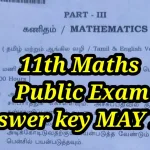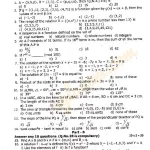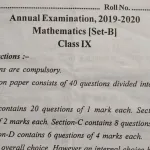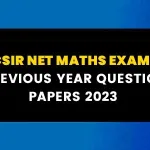Subject: English
Q1: What is the meaning of the word “benevolent”?
A1: The word “benevolent” means kind, generous, and showing goodwill towards others.
Q2: Write a short paragraph on your favorite festival.
A2: Diwali is my favorite festival. It is celebrated by millions of people across the world. During Diwali, we decorate our homes with lamps, make sweets, and spend time with family.
Q3: What are adjectives? Give two examples.
A3: Adjectives are words that describe nouns. For example, “beautiful” and “tall” are adjectives.
Q4: Explain the difference between “has” and “have” with examples.
A4: “Has” is used with singular subjects, and “have” is used with plural subjects. For example, “She has a cat” and “They have a dog.”
Q5: Write the antonyms of the following words: happy, long, strong.
A5: The antonyms of “happy” are “sad,” “long” is “short,” and “strong” is “weak.”
Subject: Mathematics
Q6: What is the perimeter of a rectangle with length 5 cm and breadth 3 cm?
A6: The perimeter of a rectangle is calculated by the formula P = 2(l + b). Therefore, the perimeter is 2(5 + 3) = 16 cm.
Q7: Solve 246 + 389.
A7: The sum of 246 and 389 is 635.
Q8: What is the area of a square with a side of 4 cm?
A8: The area of a square is calculated by A = side × side. Therefore, the area is 4 × 4 = 16 cm².
Q9: Multiply 54 by 7.
A9: 54 × 7 = 378.
Q10: What is the value of 120 ÷ 6?
A10: The value of 120 ÷ 6 is 20.
Subject: Science
Q11: What is the process of photosynthesis?
A11: Photosynthesis is the process by which plants make their own food using sunlight, water, and carbon dioxide, producing oxygen as a byproduct.
Q12: Name the three states of matter.
A12: The three states of matter are solid, liquid, and gas.
Q13: What is the function of the heart in the human body?
A13: The heart pumps blood throughout the body, delivering oxygen and nutrients to cells and removing waste products.
Q14: Why do we need oxygen?
A14: We need oxygen to breathe and to help our cells produce energy from food.
Q15: What is the difference between herbivores and carnivores?
A15: Herbivores are animals that eat plants, while carnivores are animals that eat other animals.
Subject: Social Studies
Q16: Who was the first President of India?
A16: The first President of India was Dr. Rajendra Prasad.
Q17: What is the capital city of India?
A17: The capital city of India is New Delhi.
Q18: Explain the significance of Independence Day in India.
A18: Independence Day is celebrated on August 15th every year to commemorate India’s independence from British rule in 1947.
Q19: Name the two major rivers in India.
A19: The two major rivers in India are the Ganga and the Yamuna.
Q20: What is a democracy?
A20: Democracy is a system of government where the people elect representatives to make decisions on their behalf.
Subject: Hindi
Q21: Write a short story about the importance of honesty.
A21: Once upon a time, there was a young boy named Ravi who found a wallet on the road. He returned it to its owner and was praised for his honesty. His act of honesty made him a role model in his community.
Q22: What is the synonym of the word “teacher” in Hindi?
A22: The synonym for “teacher” in Hindi is “अध्यापक” (Adhyapak).
Q23: Translate this sentence into Hindi: “I love reading books.”
A23: मैं किताबें पढ़ना पसंद करता हूँ। (Main kitaabein padhna pasand karta hoon.)
Q24: What is the Hindi term for “family”?
A24: The Hindi term for “family” is “परिवार” (Parivar).
Q25: Write a poem on nature in Hindi.
A25: प्रकृति की छांव में, सब कुछ प्यारा लगता है।
पक्षियों का गाना, हवा का बहना,
हरियाली का रंग, और सूरज की रौशनी।
प्रकृति में ही बसी, सच्ची खुशी।
Subject: Computer Science
Q26: What is a computer?
A26: A computer is an electronic device that processes data and performs tasks like calculations, storing information, and running programs.
Q27: Define the term “software.”
A27: Software refers to the programs and operating information used by a computer to perform specific tasks.
Q28: What are input devices?
A28: Input devices are hardware used to send data to a computer, such as a keyboard, mouse, or microphone.
Q29: What is the function of the CPU in a computer?
A29: The CPU (Central Processing Unit) is the brain of the computer that processes instructions and performs calculations.
Q30: What is the difference between hardware and software?
A30: Hardware refers to the physical components of a computer, while software refers to the programs and applications that run on the computer.
Recommended Indian Books for 6th Class SA 2 Question Paper 2019
1. “The Magic of Words” by Ranjan & Anita
Publication: Ratna Sagar
This book covers grammar, vocabulary, comprehension, and short story lessons. It provides practice exercises related to sentence formation, word usage, and reading comprehension. Questions in this book typically test understanding of grammar rules and the ability to interpret short stories.
2. “Mathematics for Class 6” by R.S. Aggarwal
Publication: S. Chand Publishing
A comprehensive math book that includes topics such as fractions, decimals, basic geometry, and algebra. The questions focus on problem-solving, basic operations, and understanding mathematical concepts with real-life applications.
3. “General Science” by Lakhmir Singh & Manjit Kaur
Publication: S. Chand Publishing
This book covers a range of topics including physics, chemistry, biology, and environmental science. It offers a variety of short-answer, multiple-choice, and fill-in-the-blanks questions based on scientific facts and experiments.
4. “My Big Book of Social Studies” by K.K. Gupta
Publication: Rachna Sagar
An informative book for Social Science that includes history, geography, and civics. The questions focus on facts, dates, places, and historical events. Content is aimed at improving both factual recall and analytical skills.
5. “English Grammar and Composition” by Wren & Martin
Publication: S. Chand Publishing
This book is ideal for mastering English grammar. It includes exercises on sentence structure, parts of speech, and tenses. The questions are designed to test grammar knowledge and composition writing skills.
6. “Chhattisgarh Hindi Vyakaran” by Dr. Surendra Pratap
Publication: Vikas Publication
Focusing on the Hindi language, this book offers exercises on grammar, writing skills, and comprehension. It includes a variety of questions such as word meanings, antonyms, synonyms, and essay writing.
7. “India’s Freedom Struggle” by Tara Chand
Publication: National Book Trust
This history book details India’s fight for independence, its freedom fighters, and key events. Questions focus on the events, dates, and biographies related to India’s struggle for independence.
8. “NCERT Science Textbook for Class 6”
Publication: NCERT
The official science textbook for class 6, covering all aspects of basic biology, physics, and chemistry. Questions in this book include explanations of scientific processes, diagrams, and experiments.
9. “Social and Political Life” by Ramachandran
Publication: Orient BlackSwan
A popular civics book for class 6, focusing on democracy, diversity, and government systems. It includes questions that test knowledge on rights, duties, and the political structure of India.
10. “Our Environment” by K.K. Gupta
Publication: Rachna Sagar
This book deals with environmental science and ecological topics. The questions cover the topics of pollution, natural resources, and conservation efforts, testing both theoretical and practical knowledge.
11. “Sanskrit for Class 6” by R. Gupta
Publication: Vikas Publication
A dedicated Sanskrit book for beginners that includes lessons on grammar, vocabulary, and sentence formation. The book has questions that ask for translations, meanings, and word formation.
12. “The Complete Indian History” by H.R. Seshadri
Publication: Rupa & Co
This book gives a thorough overview of Indian history, focusing on ancient, medieval, and modern periods. Questions focus on historical events, dynasties, and important figures.
13. “Environmental Studies (EVS) for Class 6” by Shalini Suri
Publication: Pearson
This EVS book is rich in concepts regarding nature, animals, plants, and the environment. The questions test knowledge on biodiversity, conservation, and the environmental impacts of human activities.
14. “Learn Computer Science for Class 6” by K.N. Bhatia
Publication: S. Chand Publishing
A book that introduces basic computer concepts like MS Word, MS Excel, and the Internet. Questions test the student’s ability to understand software functions, data entry, and simple coding.
15. “Incredible India” by Neelam Kumar
Publication: Ratna Sagar
This book gives an overview of India’s culture, geography, and famous landmarks. The questions test geographical knowledge, historical facts, and cultural diversity in India.
16. “Hindi Vyakaran” by R.C. Gupta
Publication: Vikas Publication
Focusing on Hindi grammar, this book includes lessons on sentence construction, vocabulary, and parts of speech. Questions test a student’s ability to write and comprehend Hindi.
17. “Exploring Mathematics” by K.C. Sinha
Publication: New Saraswati House
This mathematics book emphasizes logical problem-solving techniques and concept building. Questions often involve practical problem-solving and applying math in daily life.
18. “Fundamentals of Science” by Dr. H.C. Verma
Publication: S. Chand Publishing
A science book focusing on basic concepts in physics and chemistry. The questions are both theoretical and practical, designed to help students understand scientific principles in real-world applications.
19. “The Indian Constitution” by D.D. Basu
Publication: LexisNexis
This book provides a thorough understanding of the Constitution of India. Questions test knowledge of constitutional provisions, fundamental rights, and duties.
20. “Vedic Mathematics” by R. K. Gupta
Publication: Ranjan Publications
This book introduces students to ancient Vedic mathematics methods. The questions explore shortcuts, mental calculations, and methods that simplify complex mathematical problems.
6th Class SA 2 Question Paper 2019: A Guide for Students and Teachers
The 6th Class SA 2 Question Paper 2019 is an important part of the academic journey for students in India. It evaluates a wide range of skills and knowledge that students have accumulated throughout the year. The SA 2 (Summative Assessment 2) exam, as per the guidelines of the CBSE (Central Board of Secondary Education), is designed to assess the overall development of a student in various subjects like English, Mathematics, Science, Social Studies, and Hindi.
For students preparing for this exam, it’s crucial to understand the format and types of questions that will appear. Typically, the SA 2 exam consists of multiple-choice questions, short answer questions, and long-answer questions. The exam paper is designed to test the student’s comprehension, critical thinking, and application of concepts learned throughout the academic year.
One key to performing well in the exam is regular practice with sample papers and revision notes. Engaging with books that align with the NCERT syllabus is essential. Books like Mathematics for Class 6 by R.S. Aggarwal or General Science by Lakhmir Singh are excellent resources for practicing the concepts and questions likely to appear on the exam. These books also provide a variety of questions that help students grasp the real-world application of what they have learned.
The 6th Class SA 2 question paper will generally focus on both theoretical knowledge and practical applications. For instance, in subjects like Mathematics, students are often asked to solve word problems or perform calculations involving fractions, decimals, and basic geometry. Science questions may include short essays explaining the processes of photosynthesis or the water cycle, along with multiple-choice questions based on scientific facts.
In Social Studies, students can expect questions related to Indian history, geography, and civics. These will test their understanding of key historical events, the political structure of India, and environmental concerns. English questions focus on grammar, comprehension, and composition skills, testing students’ ability to understand texts and construct meaningful sentences.
Students can best prepare for the exam by following a systematic revision schedule, practicing with past question papers, and taking the time to understand each subject thoroughly. Teachers often recommend focusing on concepts first, then practicing the application of those concepts through sample questions. This approach not only helps students secure high marks but also ensures a deeper understanding of the subject matter.
As the 6th Class SA 2 exam approaches, it’s also important to keep stress levels in check. Regular breaks, a balanced study routine, and a focus on understanding rather than rote memorization can make a significant difference in exam performance.
FAQ for 6th Class SA 2 Question Paper 2019
Q1: What subjects are included in the 6th Class SA 2 Question Paper 2019?
A1: The 6th Class SA 2 Question Paper typically includes subjects like English, Mathematics, Science, Social Studies, and Hindi.
Q2: How many marks is the 6th Class SA 2 Question Paper worth?
A2: The SA 2 exam is generally worth 80 marks, with an additional 20 marks for internal assessment.
Q3: What types of questions are asked in the SA 2 exam?
A3: The exam includes multiple-choice questions, short answer questions, and long answer questions that test both theoretical knowledge and practical application of concepts.
Q4: How can I prepare for the 6th Class SA 2 Question Paper?
A4: Consistent revision using textbooks, practice with sample papers, and understanding the core concepts of each subject are key to preparing for the exam.
Q5: Are there any specific books recommended for SA 2 preparation?
A5: Yes, books like Mathematics for Class 6 by R.S. Aggarwal, General Science by Lakhmir Singh, and English Grammar and Composition by Wren & Martin are highly recommended for preparation.
Q6: What should I focus on while revising for the SA 2 exam?
A6: Focus on understanding the concepts, practicing with sample papers, and ensuring that you are able to apply what you’ve learned through problem-solving.
Q7: Is the SA 2 exam harder than the mid-term exams?
A7: The SA 2 exam is typically more comprehensive, covering the entire syllabus for the year. It may be more challenging due to the variety of topics tested.
Latest Posts
- Step-by-step guide to download and apply for jee mains admit card 202
- Comprehensive 2025 government holidays and recruitment details for job seekers
- JEE Mains Admit Card 2025: Your Step-by-Step Guide to Downloading the Hall Ticket
- Everything You Need to Know About 2025 Government Holidays Recruitment
- Comprehensive Guide to rrb d group recruitment 2025 – Eligibility, Vacancies, and Application
- Detailed guide to nps trust recruitment 2025 vacancies, eligibility and apply process
- Comprehensive guide to hpcl recruitment 2025 notification, vacancies, and application process
- ignou bed admission 2025 complete recruitment guide with eligibility and process
- Comprehensive Guide to Indian Army Agniveer Recruitment 2025 Notification and Jobs
- Everything You Must Know About CBSE Board Exams 2025 Changes & New Rules






